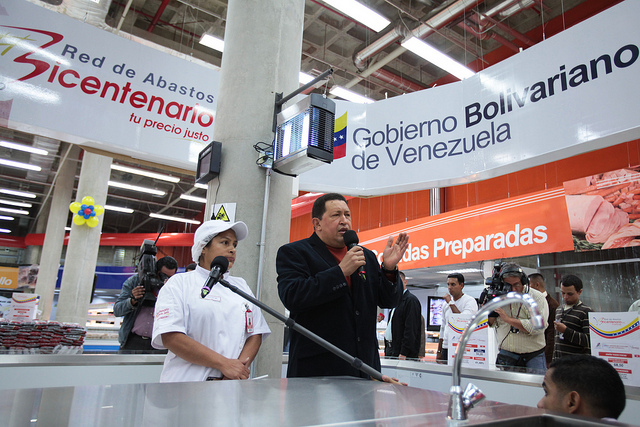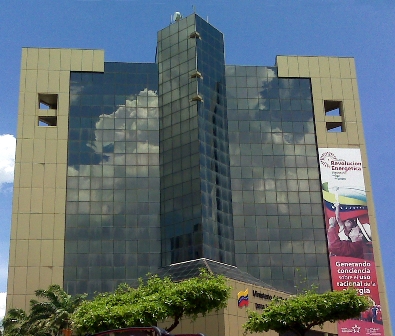
Click on the banner to read the full series
The line began at the break of dawn. Hundreds of people, that soon became thousands, filled Plaza Venezuela, in Caracas, waiting for the commercial center Bicentenário, which would be inaugurated on that day, to open its doors. But the multitude of enthusiastic consumers wasn’t the only thing to catch the attention. The most relevant fact is that this new temple of consumption is owned by the State, offering products at lower prices than the private competitors. Chávez himself was part of the opening.
Read more:
South american integration is Chávez’s main international strategy
Land reform is the strategy to obtain alimentary independence in Venezuela
Executive Office of the President of Venezuela

Chávez launches the Bicentennial mall, located in the same area where the French group Casino wanted to open the country's largest hypermarket
The shopping mall is located in the same area where the French group Casino, which was nationalized in 2010, wanted to open the country’s biggest supermarket. The government maintained the project, but decided to also give space to stores, banks and pharmacies. More than 10 000 clients walked through it on the first day, looking for the almost 20 000 items that were available, from different brands.
The shopping voracity was so intense that the mall’s manager, socialist Jóvito Ollarves, had to establish a limit of products per client. “This is a social program and thus it has its own norms and restrictions”, he explained while walking, trying to administrate the pandemonium around him. “We need to control it so everyone can be contemplated.”
Changes
The Bicentenario is an example of some of the major flows in Venezuela’s economy in the last fourteen years: employment and income rates increase as well the role of the State, there’s room for subordinated participation in private capital companies and there’s an inflationary pressure that comes from popular consumption. Even the mess formed around the cashiers is a good portrait of the process: the changes are happening in a scenario of conflict, tensions and expectations.
The first step of Chávez’s government was to progressively break the paradigms of what is known as the “Venezuelan Agenda”, the program thought by the journalist and economist Tedoro Petkoff when he was Minister of the Central Office of Coordination and Planning during Rafael Caldeira’s government as the last president of the IV Republic.
The administration of Copei (Caldeira’s party) would use the Venezuelan agenda to list several privatization measures, which would go as far as the oil industry, and to cut down public expending. Even the social security system was affected, with the end of the compensation for time of service, amongst other things. The irony is that Petkoff, who now belongs to the opposition, used to be an important left wing ideologist and militant.
Caldeira’s economic politics, at last, made it possible to increase the foreign investments, since the companies were looking for good businesses, but dropped down the popular consumption, restrained rights, cut down services provided by the State and denationalized the country’s riches. In February 1999, when Chávez took office, according to the Latin American Integration Association (ALADI) figures, inflation was almost 30% a year, 80% of the population was poor, 39% was miserable, 18% was unemployed and 37% suffered from malnutrition.
WikiCommons
 Another inheritance left by Caldeira was the oil barrel price, around U$S 9. The most important of the country’s riches— Venezuela was the third biggest world exporter —, was as much depreciated by OPEC’s (Organization of the Petroleum Exporting Countries) subordination to American and European interests, as by the series of laws that practically made PDVSA, although a state company, be out of the government control.
Another inheritance left by Caldeira was the oil barrel price, around U$S 9. The most important of the country’s riches— Venezuela was the third biggest world exporter —, was as much depreciated by OPEC’s (Organization of the Petroleum Exporting Countries) subordination to American and European interests, as by the series of laws that practically made PDVSA, although a state company, be out of the government control.
[Headquarters of PDVSA in Maracaibo, Venezuela]
The first years of Chávez’s government were complicated. The government’s energies were invested in the battle to transform the political system, which would reestablish the instruments the State needed for its new economic politics. Under the unstable situation, that included the coup d’état and the lockout in 2002, the production fell rapidly during three of the first five years of his government. It fell 6.1% in 1999, 8.9% in 2002 and 9.2% in 2003; and increased 3.2% in 2000 and 2.8% in 2001. In the balance sheet of the first five years, there was 17.60% drop.
Part of the businessmen and their international partners reacted going against the reforms Chávez started to adopt in the end of 2001, especially the Land Law, which started the land reform, and the Hydrocarbon Law, which altered lots of property rules and oil taxes.
“The oil companies, until then, would pay a little over 1% in taxes”, says Nelson Merentez, current president of the Central Bank and former minister of Finance, who is also a sympathetic math teacher that still finds time to teach classes. “The government raised that rate to 33% and made PDVSA a majority partner of all of the other oil companies, besides putting the State company under his command. Before, there was a State inside the State.”
Only in 2003, when the lockout was defeated, Chávez’s government was able to take advantage of the main device available for the Venezuelan development, petroleum. Also, the president made agreements, inside OPEC, to reduce the oil production, making the barrel price go up to US$ 23 in December 1999, the begging of an increase in oil prices that would get to more than US$ 100 a barrel in the last few years. The economic situation began to change.
The first of the government’s measures, starting in 2004, was to multiply the social programs, such as the health and education missions, amongst others. Besides facing the dramatic poverty level, and the ruin of the public services inherited from the last government, it was able to recover the economy, and both employment and income rates.
The rise in the international oil prices, associated with the social investments and with new infrastructure projects, gave a new shape to the country’s numbers. In the second quinquennium of Chávez’s government, the country had the biggest GNP growth rate in South America and one of the biggest in the world. It had a 61.20% increase in the period, an annual average rate above 10%. The GNP rate would only fall again in 2009 (-3.3%) and 2010 (-1.4%), during the world crisis, only to increase again in 2011 (4%).
Industrialization and infrastructure
The new fiscal and financial resources, originated from this period of prosperity, helped to broaden the social programs, to the point of making Venezuela the least unequal country in the subcontinent, reducing drastically misery and poverty rates, among other positive numbers. But they were also used, particularly in 2006, to provide the State with stronger mechanisms to intervene in the economy.
Public funds were created to finance industrialization and infrastructure, in addition to investing in the social programs. The most important of those is Fonden (National Development Fund), created in 2005, with an initial investment of only US$ 5 billion, that will have reached almost US$ 100 billion in 2012. Well-supplied by the oil revenues and by the Central Bank reserves, this fund, which today is responsible for more than 400 large projects, allowed the State to nationalize strategic companies, to make logistical works and to stimulate social programs.
In spite of the fact that the nationalizations were originally thought to include only some structural segments of the economy (energy, telecommunications and financial system), it ended being spread to, sometimes chaotically, other types of activities. The state acquires several companies to resolve production shortages or supplying issues, to fight the capitalist resistance to its politics or because of employee’s demands.
The capital flight was one of the main devices used by the businessmen that didn’t want to be submitted to the government rules or that just weren’t interested in investing in the country. Soon after Chávez was reelected, in the end of 2006, according to Central Bank figures, more than US$ 10 billion were sent offshore in a few weeks’ time. The government decided, then, to centralize the currency exchange and to make any process of international remittance or importing go through a rigid system of approval. The nationalization, in that context, was used several times to punish some companies and to stop them from being emptied.
The main issue is that the accelerated growth of the domestic market — driven by the salary and employment increase and by the widening of services free of charge — put the production in check. The annual inflation is around 25%, but the salaries rise above that inflation. The boom in demand, in several moments, provoked shortage of products.
Opera Mundi
.jpg)
“Before PDVSA was a state within a state,” says Nelson Merentez, current president of the Central Bank and former Finance Minister
The search for solutions to these impasses is the current agenda. “We are not a neoliberal economy”, says Merentez. “Our logic is not to cut down the demand to protect the capital remuneration at all costs, but to amplify the offer through increasing investments in different forms of property.”
Four types of economy
Even though the power of the State has increased in the last few years, there’s no one in the government that would defend a model inspired by the Soviet or the Cuban experiences, which were marked by the nationalization of almost all means of production and distribution.
Recent laws have set four types of economy. The first, based on state control, is potentially oriented to make possible the above mentioned national development. The second is based on private property and competition, and it is supposed to be concentrated only on the sectors that do not affect the strategic development of the country. A third one, mixed, is represented by the association of the State and national or foreign private companies. And finally a fourth type, that covers cooperative and communal economy, made of companies owned by communal counsels and based on self-management.
This fourth type of property, a little based on the methods used by Tito’s Yugoslavia between 1950 and 1980, is nowadays the apple of a lot of the country’s chiefs’ eyes. It gets down to being a strategy of collective entrepreneurism, through which the citizens themselves, using their associations, create companies able to offer services, produce products that are not technologically complex and also partially supply the food demand.
“The development of the communal economy is fundamental to beat inflation and to avoid shortage situations”, says the heterodox president of the Central Bank. “A lot of the products and services that are vital to the population can be made locally, supplying the demand and generating income where the citizens live, under their control and property.”
The dream of an economy that has no State or boss is not exactly new. But in Venezuela it is inflated by an enormous oil income, nowadays entirely controlled by the government, that can even afford to give wings to the imagination.
.jpg)
NULL
NULL
























































